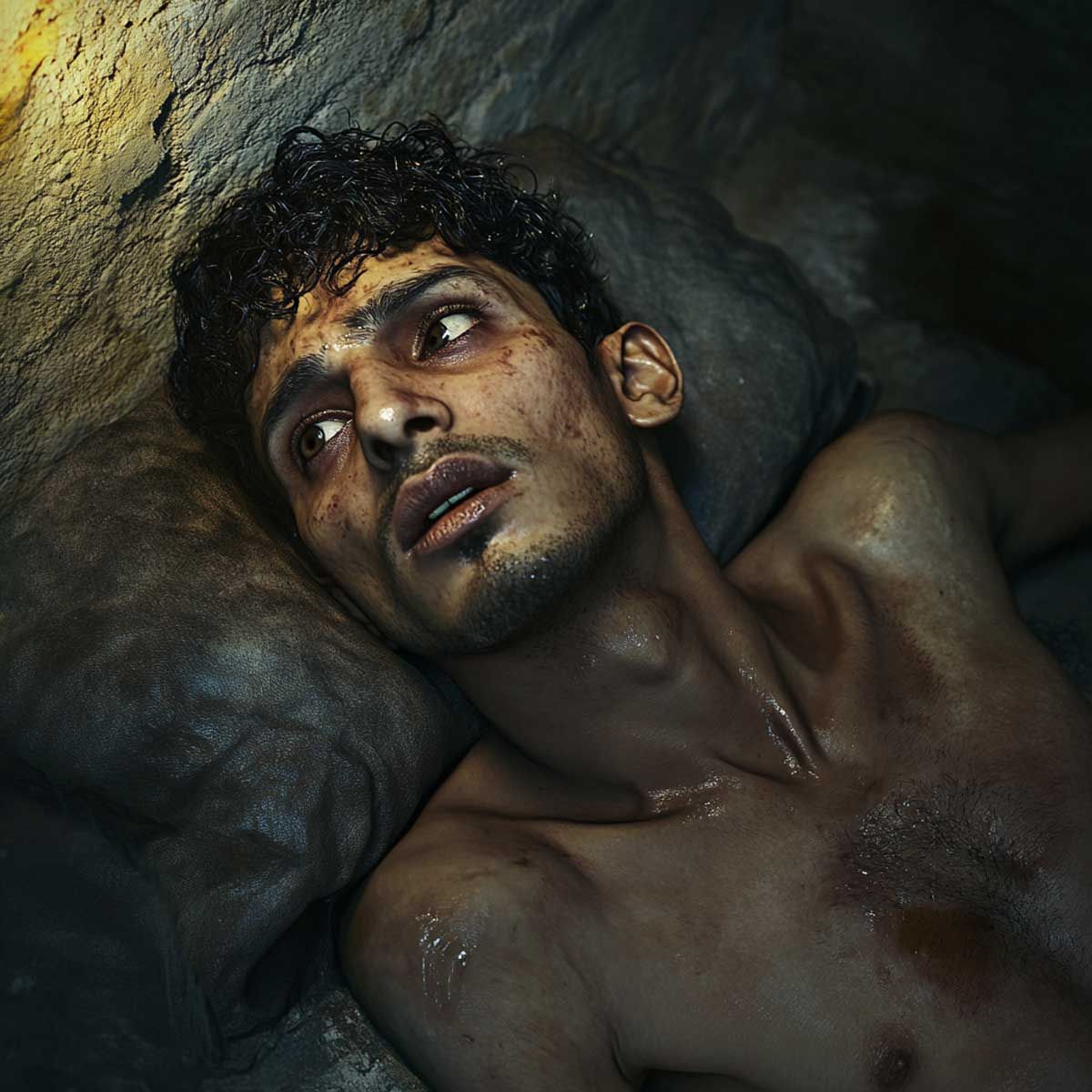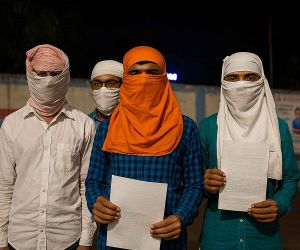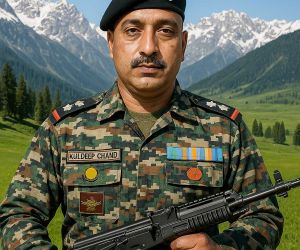MORE COVERAGE
Twitter Coverage
Satyaagrah
Written on
Satyaagrah
Written on
Satyaagrah
Written on
Satyaagrah
Written on
Satyaagrah
Written on
JOIN SATYAAGRAH SOCIAL MEDIA
"Home of the free, especially for the 'wanted'": From harboring Khalistanis like Nijjar to shielding the assassin of Sheikh Mujib, Nur Chowdhury, Canada's actions reveals its double standards and raise critical questions about the nation's true values
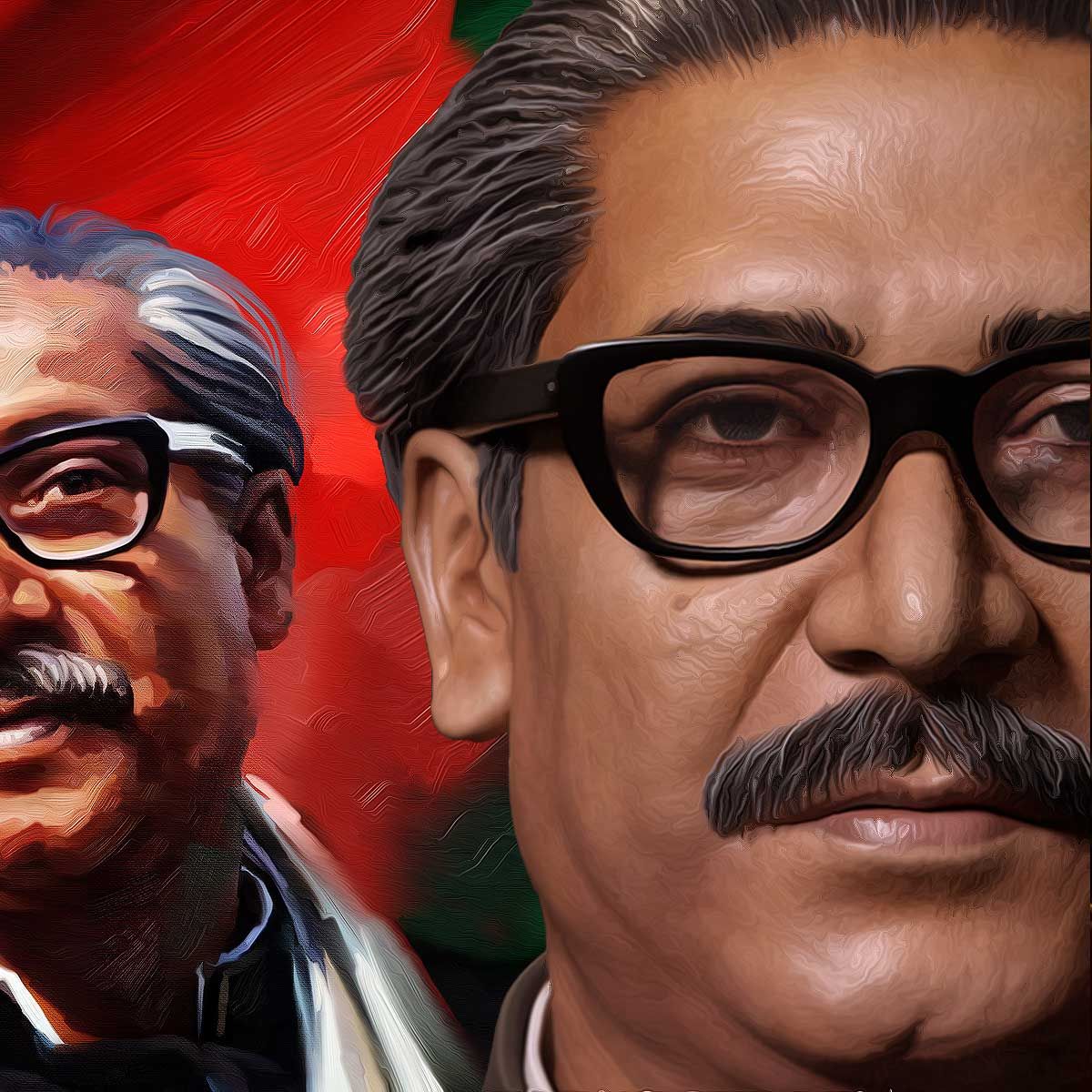
"Home of the free, especially for the 'wanted'": From harboring Khalistanis like Nijjar to shielding the assassin of Sheikh Mujib, Nur Chowdhury, Canada's actions reveals its double standards and raise critical questions about the nation's true values
In recent times, a prominent diplomatic clash has captured global attention. Hardeep Singh Nijjar, a leader affiliated with the prohibited Khalistan movement and a Canadian-Indian national, was tragically murdered by unidentified individuals at a Sikh temple located in Surrey, British Columbia, during the month of June. The event has incessantly dominated international headlines and remained at the epicenter of news stories.
|
Fast forward to four months after the incident, an unforeseen proclamation was made by Canadian Prime Minister, Justin Trudeau. Addressing the House of Commons at the monumental Parliament Hill, he emphatically revealed to the gathered lawmakers that his government was in possession of "credible" evidence. This evidence, he hinted, suggested a plausible connection of Indian intelligence agencies to Nijjar's assassination.
However, Mohiuddin Ahmad, a renowned political historian, provided an astute observation on the matter. He underscored that while Canada was quick to publicize allegations pointing towards India, it maintained a stark silence on another pressing concern. "Canada came out in the public domain regarding the allegations against India. But on the other hand, Canada has never made public the Chinese interference and their covert activities," Ahmad elucidated.
Adding another layer of complexity to the situation, Canada's stance on free speech has also come under fire. The country, known for its liberal values, has been seen as lenient towards hate speech, especially when uttered by radical Sikh factions. Such actions, when viewed under the lens of freedom of speech, raise uncomfortable questions about potential double standards. Ahmed's sentiments were sharp and clear, labeling the government's approach as not just a double standard but outright "hypocritical."
Yet, amidst the international furore and debates, a conspicuous silence prevails from Canada's allies. Trudeau, on his part, seems to be caught in a dichotomy. He seeks censure from Western countries while concurrently urging India to collaborate on the investigation surrounding the murder of professed Khalistani extremists. It's noteworthy to mention that the fervent campaign advocating for Khalistan, a separate land for Sikhs, is believed to have backing from Pakistan's infamous spy agency, the Inter-Service Intelligence (ISI).
As we delve deeper into the issue, it becomes evident that the deportation conundrum Canada faces isn't limited to Khalistanis. Another name surfaces, linked to a historical assassination in Bangladesh, adding another layer to this intricate diplomatic tapestry.
|
Canada's Tangled Web of Deportation and Diplomatic Strains
The unfolding drama around the assassination of Hardeep Singh Nijjar, chief of the Khalistan Tiger Force (KTF), continues to create ripples in international diplomatic circles. The weight of the allegations brought forth by Canadian Prime Minister, Justin Trudeau, remains significant. Yet, the Canadian government is still to unveil the concrete evidence that implicates India in Nijjar’s untimely death. Given this ambiguity, garnering cooperation from New Delhi seems an uphill battle.
Further amplifying tensions between the two nations, Ottawa's refusal to extradite certain "most-wanted" Sikhs accused of crimes in India has been a bone of contention. This, in turn, has initiated a retaliatory cycle, leading to the expulsion of spy agency officials operating under diplomatic covers in both countries.
Drawing parallels with the escalating situation, Indian-born Professor Ashok Swain from Uppsala University in Sweden took to Twitter, making a bold proclamation. In his tweet, he quipped, “Modi has made Canada, India’s new Pakistan!”
History, it appears, is somewhat repeating itself. Recalling past events, Pierre Trudeau, the father of the current Canadian Prime Minister, declined India’s plea to extradite Talwinder Singh Parmar. Parmar, leading a radical faction, has been implicated as the mastermind behind a catastrophic event in 1985. The act in question pertained to the placement of a bomb on an Air India flight which tragically detonated midair, resulting in the loss of 329 innocent lives. Notably, out of the victims, 268 were Canadian citizens.
Yet, the shadows of Canada’s past run deeper than recent political disagreements. Many newcomers to the nation remain oblivious to the fact that Canada has, in times gone by, been a sanctuary for Nazi war criminals, amongst other felons, who have found refuge and evaded justice.
|
The integrity of Canada’s immigration framework also stands questioned. High-profile politicians and officials from various countries, (the specifics of which have been withheld), have allegedly exploited Canada's system. The modus operandi? Laundering ill-gotten gains accrued from corruption, theft, and illicit cartel operations. The Canadian immigration policy, which seemingly operates on a "no questions asked" basis for newcomers, is in the spotlight.
A startling revelation from the Commission of Inquiry on War Criminals spearheaded by Justice Jules Deschênes in the mid-'80s, brings forth a jarring statistic. Close to a thousand individuals, indicted for heinous war crimes, are believed to have found refuge on Canadian soil.
The Royal Commission, a paramount Canadian investigative body, has made startling revelations, casting a long shadow on Canada's historical stance regarding war criminals. Identified Nazi war criminals, notorious for their heinous acts committed during the era of World War II, found not just refuge, but also permanent residency in Canada. Their illicitly amassed wealth, largely siphoned from the Jews and the broader European populace, appears to have been a ticket to their new lives in Canada.
Howard Margolian's 2000 publication, 'Unauthorized Entry: The Truth about Nazi War Criminals in Canada, 1946-1956', reignites the simmering debate and collective soul-searching. His work corroborates what advocacy groups, media, and even a royal commission have been asserting - Canada's somewhat lenient approach towards those with tainted pasts.
Yet, in a positive turn, the Commission's recommendations weren't entirely in vain. Canada introduced the Crimes Against Humanity and War Crimes Act in 2000, signifying a robust commitment to hold such criminals accountable. The legislation bore fruit when a Rwandan immigrant was convicted of participating in the genocide, resulting in a life imprisonment sentence in 2009. With the Canadian Crimes Against Humanity and War Crimes Programme's ongoing investigations, around 200 individuals residing in Canada face scrutiny for their alleged roles in various atrocities.
|
Despite the initiatives, Canada's reluctance to address extradition requests, especially from India and Bangladesh, has been glaring. India's numerous appeals over the years, seeking extradition of "most-wanted" extremists, seem to have fallen on deaf ears. Canada's lack of an explicit response has only deepened the rift.
Bangladesh's anguish mirrors India's sentiments. For over two decades, Bangladesh has been seeking the deportation of one S.H.M.B. Nur Chowdhury. A former army officer, Chowdhury is implicated in the assassination of the revered Bangladeshi figure, Bangabandhu Sheikh Mujibur Rahman. This act, which occurred during a military coup on 15th August 1975, was a dark chapter in Bangladesh's history. Chowdhury, now aged 73, has found a safe haven in Canada since 1996.
Canadian journalist Charlie Gillis aptly describes the situation in his piece, "The assassin among us." When confronted, Chowdhury, in an interview with the Canadian Broadcasting Corporation (CBC), evaded direct responsibility. He shifted the blame for his alleged involvement in Bangabandhu's assassination, asserting that he merely followed orders as a junior military officer.
Sheikh Hasina, the sitting Prime Minister of Bangladesh and the daughter of the slain Bangabandhu Sheikh Mujib, has left no stone unturned in her quest for justice. She directly approached her Canadian counterpart, Prime Minister Justin Trudeau, fervently requesting the deportation of her father's assassin. However, her pleas seemingly echo into voids, with no significant action taken in response.
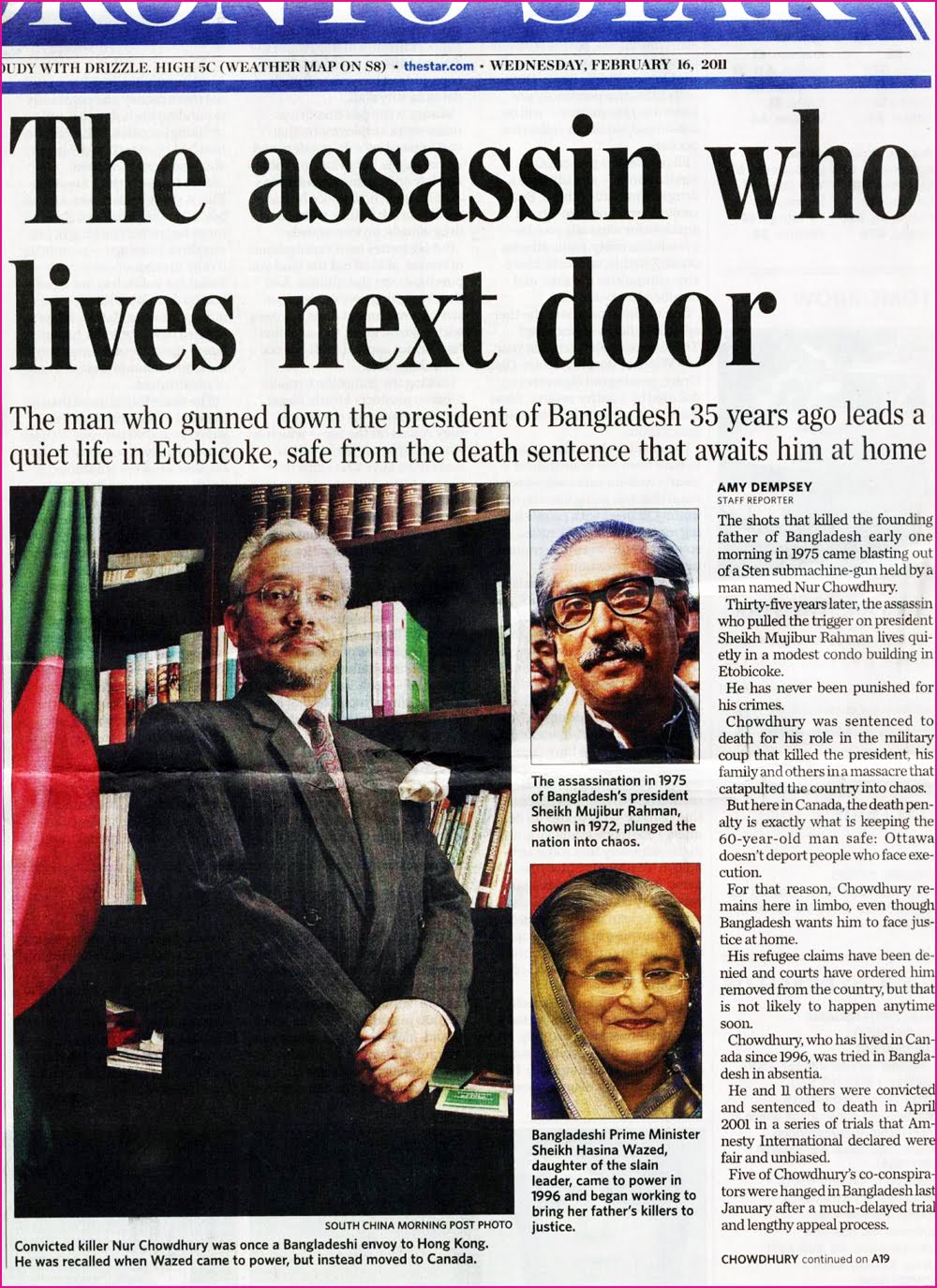 |
| Canada is accused of sheltering Nur Chowdhury alleged to be part of an assassination plot that killed Bangladesh founder Sheikh Mujibur Rahman and most of his family in 1975 |
The clear stand of the Canadian administration was articulated by the Canadian High Commissioner to Bangladesh, Heather Cruden, in September 2011. “Our government has a clear policy that we cannot extradite people to a country where there is [a] death sentence,” she proclaimed to the media in Dhaka. This stand undeniably escalates the existing tensions between Canada and Bangladesh. Bangladeshi officials, frustrated with the prolonged delay, have on occasions accused Canada of sheltering the nation's most-wanted fugitive for an extensive 27 years.
Elaborating on the government's position, various Canadian ministries, including the Ministry of Justice and Attorney General, Ministry of Citizenship and Immigration, and the Ministry of Foreign Affairs, hold a unified stance. Their policy directives indicate a profound skepticism towards the Bangladesh judiciary, viewing it as potentially influenced by political motivations. They further stress on potential risks faced by an individual upon returning to their home nation, stating, “There are possibilities of being harmed when the person is forced to return to his country of origin.”
Chowdhury, whose actions have led to him being branded as a fugitive by Bangladesh and even Interpol, found himself in a precarious situation in Canada. Despite being indicted in absentia for Sheikh Mujib's assassination, and having a death sentence pronounced against him by a special tribunal in Dhaka in 1998, Canada's policy and stance have shielded him. Yet, it is worth noting that the Canadian media's consistent coverage of the issue, potentially influenced by international sentiments, might have contributed to the continuous rejection of Chowdhury's asylum plea.
Even after seeking respite from various judicial quarters in Canada, including the refugee court, appeal court, and higher courts, Chowdhury has faced consistent denials. His dream of settling in Canada has been met with repeated obstacles, leaving his future uncertain and the justice sought by many still elusive.
Shahidul Islam Mintu, a significant figure among the Bangladeshi diaspora in Canada, has been closely monitoring the intricate tale of Chowdhury. Mintu, the brain behind the first 24/7 NRB Television targeting the Bangladeshi community in Canada, sheds light on the fugitive's life in hiding. He paints a vivid picture of a man burdened by his past, only venturing out of his Etobicoke, Toronto apartment for essentials like groceries.
But it wasn't always quiet for Chowdhury. Mintu recalls an instance where enraged Bangladesh nationals confronted Chowdhury, publicly condemning him for his alleged role in Mujib's assassination and clamoring for justice. Despite the weight of these allegations, Chowdhury has, for the most part, been successful in maintaining a life of seclusion away from the prying eyes of the public.
Canada's deportation conundrums aren't restricted to Chowdhury. A surprising twist arose when Ottawa expressed its intention to negotiate with Washington DC, to potentially relocate rogue military officer AKM Mohiuddin Ahmed to a third country. Ahmed, who vociferously denies any involvement in the assassination of Sheikh Mujib, found himself in a precarious situation similar to Chowdhury. Despite his pleas, his asylum case in Los Angeles, USA, was consistently rejected. In an unexpected turn of events, the US authorities decided to deport Ahmed, leaving Bangladesh both stunned and on high alert.
|
Ahmed's return to Bangladesh culminated in a profound display of justice – he was executed by hanging, finally facing the consequences of his alleged crimes.
Amidst the swirl of these complex deportation tales, an archive from Parliament Hill, dated 29 May 2007, emerges as a testament to the continuous dilemma faced by Canada. Irwin Cotler, the Minister of Justice, in a passionate address to the Speaker of Parliament, emphasized, “a former Bangladesh diplomat with a Canadian connection is facing imminent deportation from the U.S. to Bangladesh where he will be executed after a political trial was held in absentia." This plea was further accentuated by Ms. Diane Finley, the Minister of Citizenship and Immigration.
For the last several years, Canada's immigration policies have come under intense scrutiny, fuelled by a slew of complex geopolitical and humanitarian issues. From the diplomatic spat over Hardeep Singh Nijjar's assassination to Canada’s handling of refugees, and even its stance on wanted fugitives, there's been much to contemplate.
Canadian Prime Minister Justin Trudeau had raised eyebrows when he suggested a potential link between Indian intelligence and the assassination of Nijjar, a move which not only strained diplomatic ties but also spotlighted Canada's controversial immigration stance. According to political historian Mohiuddin Ahmad, Canada's selective transparency on interference from nations like China further highlights an apparent "double standard."
Canada's refusal to extradite militants wanted in India, including the likes of Talwinder Singh Parmar, the key suspect behind the mid-air explosion of an Air India flight in 1985, has long been a sore point between the two nations. And this isn't an isolated incident. The book ‘Unauthorized Entry: The Truth about Nazi War Criminals in Canada, 1946-1956’ by Howard Margolian revealed that even Nazi war criminals had found refuge in Canada, bringing with them immense wealth looted during World War II.
Canada's response to the repeated extradition requests from India contrasts starkly with its handling of S.H.M.B. Nur Chowdhury, the prime suspect in the assassination of Bangabandhu Sheikh Mujibur Rahman, the founding father of Bangladesh. Despite Chowdhury's multiple asylum rejections, he continues to find refuge in Canada. Canadian journalist Charlie Gillis encapsulated the general sentiment when he wrote, "The assassin among us."
Yet, it's not just Chowdhury. Canada's approach to AKM Mohiuddin Ahmed, another implicated in the assassination of Sheikh Mujib, underscores the nation's tangled web of policies. Despite multiple asylum rejections in Los Angeles, it was Ottawa that wanted to negotiate his move to Canada.
However, on 29 May 2007, a notable declaration by Irwin Cotler, Minister of Justice, shook the very foundation of the discourse. Highlighting a former Bangladeshi diplomat's imminent deportation from the U.S. and probable execution in Bangladesh, Cotler posed a direct challenge to Canada's immigration policies.
And while Diane Finley, Minister of Citizenship and Immigration, assured that Canada has "one of the most welcoming and fair immigration systems in the world," that statement seems at odds with the critical reports from Human Rights Watch (HRW) and Amnesty International, which have painted a contrasting picture of Canada’s immigration practices.
Ketty Nivyabandi, secretary general of Amnesty International Canada, emphasized the paradox, commenting on how Canada’s "abusive immigration detention system" directly contradicts the nation’s global reputation for "equality and justice."
However, there are instances that highlight Canada's commitment to human rights. The country has, after all, been a haven for hundreds of victims of torture, including journalists, writers, and academicians. But, the darker chapters of forced deportations, like the case of Maher Arar, a Syrian-born Canadian citizen who became a victim of rendition and was tortured in Syria, still cast a long shadow.
Canada, known globally for its values of equality, justice, and humanitarian stance, often projects itself as a beacon of hope for many. However, several incidents through the years have highlighted the convoluted reality behind its immigration policies and decisions.
The case of Maher Arar is a stark reminder of this contradiction. Arar, mistakenly identified by Canadian police as a member of the international terror network Al Qaeda, suffered a traumatic ordeal of wrongful detention and torture in Syria. Canada's eventual decision to repatriate Arar, coupled with a compensation of $10.5 million, was not just a financial restitution but a symbolic acknowledgment of a grievous misstep.
Yet, Arar's case isn't isolated. The stories of Noura Al-Jizawi, flagged as a security risk, and Joseph Attar, who endured 15 years of imprisonment in Egypt on spying charges, further unveil the ambiguities and complications in Canada's approach. In 2007, Canada's formal apology to Abdullah Almalki, Ahmad Abou-Elmaati, and Muayyed Nureddin - three Canadians who suffered due to indirect responsibilities of Canadian officials - was another testament to the nation's fallibility in its handling of immigration-related issues.
As for Nur Chowdhury, his case remains emblematic of the struggles that come with navigating the line between justice and humanitarian concerns. Despite being indicted in absentia for the murder of Sheikh Mujib, and with Interpol's red flag against his name, Chowdhury still finds refuge in Canada. The diplomatic intricacies of this situation reflect the broader challenges nations face when addressing such contentious issues. As Chowdhury continues to seek divine intervention for his safety, the hope for justice from the perspective of Bangladesh remains, for now, in limbo.
To sum it up, while Canada undoubtedly remains a sanctuary for countless refugees and immigrants, its immigration policies and decisions reveal a complex tapestry of challenges, controversies, and imperfections. As the international community continues to grapple with evolving geopolitical scenarios, it becomes essential for nations like Canada to introspect, learn from past missteps, and strive towards a more consistent and just approach.
 Support Us
Support Us
Satyagraha was born from the heart of our land, with an undying aim to unveil the true essence of Bharat. It seeks to illuminate the hidden tales of our valiant freedom fighters and the rich chronicles that haven't yet sung their complete melody in the mainstream.
While platforms like NDTV and 'The Wire' effortlessly garner funds under the banner of safeguarding democracy, we at Satyagraha walk a different path. Our strength and resonance come from you. In this journey to weave a stronger Bharat, every little contribution amplifies our voice. Let's come together, contribute as you can, and champion the true spirit of our nation.
 |  |  |
| ICICI Bank of Satyaagrah | Razorpay Bank of Satyaagrah | PayPal Bank of Satyaagrah - For International Payments |
If all above doesn't work, then try the LINK below:
Please share the article on other platforms
DISCLAIMER: The author is solely responsible for the views expressed in this article. The author carries the responsibility for citing and/or licensing of images utilized within the text. The website also frequently uses non-commercial images for representational purposes only in line with the article. We are not responsible for the authenticity of such images. If some images have a copyright issue, we request the person/entity to contact us at satyaagrahindia@gmail.com and we will take the necessary actions to resolve the issue.
Related Articles
- "Face the future, say 'bring it on'": NIA lists 43 top criminals, including Canada-based with Khalistani ties, as tensions rise, Trudeau implicates India in Nijjar's Canada murder; India promptly refutes, calling the accusation 'absurd and motivated'
- Amidst Trudeau's allegations against India, Sri Lanka condemns Canada's double standards, highlighting Ottawa's controversial recognition of a Nazi veteran and its past accusations of 'Tamil Genocide', Canada's international image is under severe scrutiny
- Sikhs for Justice accused Russia of aiding India’s RA&W in killing Khalistani terrorist Nijjar; Russia denied claims, called SFJ’s $25K reward for tracking diplomats unacceptable, sought law enforcement action, and protection under Vienna Convention laws
- "Unity, not division, is the foundation for progress and peace": Escalating Tensions in Canada: Indian diaspora holding the Tricolour, counters Khalistani separatists outside the consulate to protect their diplomats amidst Trudeau's political predicament
- "New India, NaMoIndia": Under PM Modi's resolute leadership, India stands firm in the face-off with Canada, leading to a comedic exit of 41 Canadian diplomats, India's new era of assertiveness clearly doesn't mesh with Canada's silly diplomatic approach
- "Canada National Sport - The Blame Game": Indian High Commissioner challenges Canada's 'conviction' of India in Nijjar case, emphasizing the importance of a thorough & conclusive investigation before drawing conclusions in international diplomatic affairs
- Trudeau leverages Khalistan narrative against India with US intelligence backing. SFJ's G.S Pannu, with dual US-Canada citizenship, incites against Indian diplomats, leading to speculations about potential CIA ties as shared by India's intelligence head
- "अस्सी खालिस्तानी गुंडे": Khalistani goons attacked Hindu devotees at Brampton's Hindu Sabha Temple on Nov 3, 2024; Peel Police sided with the attackers, targeting Hindus in their own temple, Leaders Trudeau & Poilievre failed to name the Khalistanis
- "From Father to Son: A Troubling Legacy": In a sinister echo of the past, Canadian PM Trudeau openly endorses Khalistani elements against India, uncovering the dark history of Pierre Trudeau shielding notorious Kanishka bombing mastermind Talwinder Parmar
- Sukhdool Singh, a notorious gangster listed by NIA assassinated in Canada, highlighting the growing web of Punjab's criminals overseas, as India's concerns rise, the spotlight turns to Canada's stance on sheltering such elements from Punjab's underworld
- "Nations stand tall when they stand firm": Amid soaring India-Canada tensions, India strikes a decisive blow against Khalistanis, seizing assets of Sikhs For Justice chief Gurpatwant Singh Pannun & Hardeep Singh Nijjar, reshaping geopolitical landscape
- "In the corridors of espionage, clarity is elusive": Sources shed light on Pakistan's ISI's alleged orchestration of terrorist Hardeep Nijjar's assassination in Canada, pointing to his resistance against supporting newly-arrived gangsters backed by ISI
- Amid rising tensions, Sikhs and Hindus held an anti-Justin Trudeau protest at the Canadian Embassy in Delhi over attacks on Hindu temples by Khalistanis, Trudeau acknowledged Khalistani presence as India-Canada relations worsen after Nijjar's killing
- 28-year-old Khalistani terrorist Arshdeep Dalla, an aide to Hardeep Singh Nijjar detained in Canada, linked to murders, extortion and terror modules in Punjab, his associates remain active as Indian extradition efforts face hurdles amid diplomatic tension
- "Turbulence tests the strength of community bonds": Hindu temple in Canada faces vandalism by Khalistan supporters, spotlighting escalating tensions after Khalistani activist Hardeep Singh Nijjar's death, What's next for the Hindu community abroad






